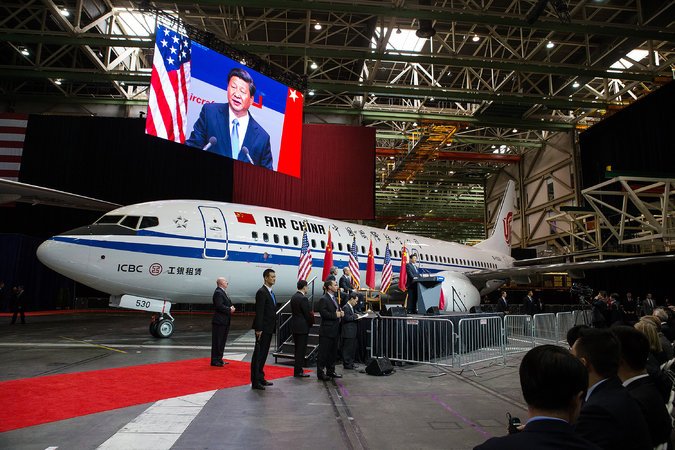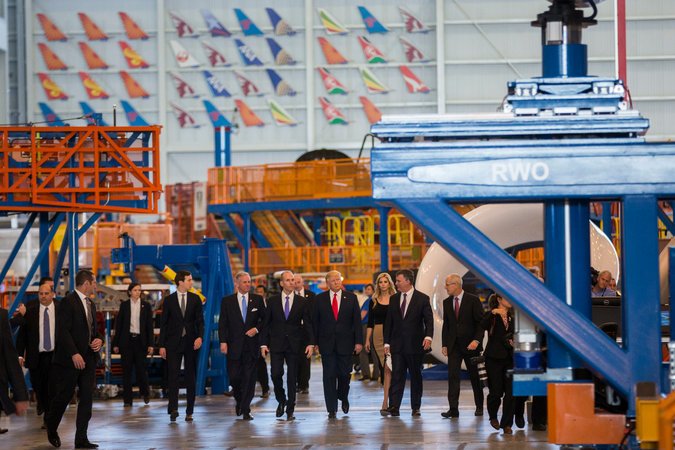Boeing has prospered since Mr. Trump’s election. Its shares have soared, and last year it posted record earnings and cash flow. Much of that money was made abroad, though, and a counterattack aimed at Boeing could reverberate into the farthest reaches of the nation’s industrial economy.
The company employs 137,000 people in the United States, nearly as many workers as the entire primary steel and aluminum industries. Many more work at its suppliers, from Kansas to Pennsylvania, and those employees would also be at risk of a gut punch if China and other countries chose to make an example of Boeing.
“I’m really worried about what it’s going to do to us,” said James Springer, a mechanic who installs stow bins and class dividers on 787 Dreamliners at Boeing’s plant in North Charleston, S.C. “What will the E.U. and China do, especially China? They are one of our biggest customers now.”

But China, too, depends on Boeing, and damage inflicted on the company would not be painless. China has a seemingly insatiable need for new aircraft, and can’t yet make them domestically. Boeing is also set to open a finishing plant near Shanghai this year, so the Chinese government may put quality jobs at risk if it were to cut the company off.
“If China decides to retaliate, it hurts their airlines and their burgeoning aerospace industry,” said Scott Hamilton, the managing director at the Leeham Company, an aviation consulting firm in Bainbridge Island, Wash. “Why would you do that?”
But if China wanted to exact revenge on the United States through Boeing, it would be uniquely positioned to do so. The government has a significant stake in its national airlines and can easily direct them to cancel orders. About a quarter of Boeing’s jetliners went to China last year, and analysts estimate that Chinese orders could account for up to a fifth of its backlog.
Until now, Mr. Trump has been a puzzle that Boeing mostly seemed to have figured out.
The president began the relationship even before his inauguration by proclaiming his displeasure at the cost of the next-generation Air Force One that Boeing is building. “Costs are out of control, more than $4 billion,” he declared on Twitter. “Cancel order!”
Boeing is building a brand new 747 Air Force One for future presidents, but costs are out of control, more than $4 billion. Cancel order!
— Donald J. Trump (@realDonaldTrump) Dec. 6, 2016
He later told reporters that Boeing was “doing a little bit of a number,” and said, “We want Boeing to make a lot of money, but not that much money.”
Advertisement
Continue reading the main story
Two weeks later, Dennis A. Muilenburg, Boeing’s chief executive, visited Mr. Trump in Florida and promised to keep the plane’s cost down. “It was a terrific conversation,” Mr. Muilenburg said afterward. “Got a lot of respect for him. He’s a good man. And he’s doing the right thing.”
Two months later, the president visited Boeing’s South Carolina plant and, standing before a 787 Dreamliner, proclaimed, “God bless Boeing.”
While campaigning, Mr. Trump had repeatedly criticized the Export-Import Bank, which lends so much money to the company’s customers that it has been referred to as “Boeing’s Bank.” But in his first year as president, Mr. Trump decided to keep the bank alive.
Mr. Muilenburg has praised the president for the corporate tax cut, calling it “the biggest thing we could do in this country to unleash economic energy.”

The past year and a half has indeed been good to Boeing. Its share price went up by 90 percent in 2017, making it the best performer in the Dow Jones industrial average. It has performed spectacularly so far this year.
At the end of February, the company cheerily announced that it had arrived at an agreement with Mr. Trump for an Air Force One with a new, lower price tag. “President Trump negotiated a good deal on behalf of the American people,” the company declared on Twitter. Two days later, Mr. Trump said he would pursue steep tariffs on steel and aluminum.
Boeing is proud to build the next generation of Air Force One, providing American Presidents with a flying White House at outstanding value to taxpayers. President Trump negotiated a good deal on behalf of the American people. pic.twitter.com/m0HtGfXVlv
— The Boeing Company (@Boeing) Feb. 27, 2018
“They found themselves bullied,” Mr. Aboulafia said of Boeing. “They very intelligently did the smart thing and befriended the bully, and I think they are starting to find out that being friends with the bully is just as hard as being the victim of the bully.”
Advertisement
Continue reading the main story
The tariffs alone were never going to cost Boeing very much. It doesn’t use a lot of steel, and the aluminum that encloses the body of its planes amounts to pocket change relative to an engine or the electronics system. The aircraft maker also has flexible, long-term contracts that often allow it to pass on some unanticipated cost increases to its customers, analysts said. Aluminum prices went up by more than 10 percent last year, and no one along the supply chain appeared to flinch.
The real risk is that China will lash out, and it’s difficult to say how likely that could be. Boeing and its only real rival on that front, the European company Airbus, have backlogs that stretch into the next decade.
A Chinese aerospace company, Comac, flew its first Boeing-sized jet in China in 2016, but it is years away from producing them. That may make it more attractive to punish a different American brand that makes something the Chinese can easily find elsewhere.
On the other hand, the Chinese government may have more leverage over Airbus than it seems. China is expected to surpass the United States to become the world’s biggest aviation market by 2022, according to the International Air Transport Association. That growing dominance could help the government lean on Airbus to ramp up production to fill a potential hole left by Boeing, aerospace consultants said.
A more moderate option for the Chinese would be to keep current orders on the books, but stop purchasing new Boeing aircraft. That could make for a less intense, but more drawn-out, period of pain for the manufacturer.
If it loses significant ground in China, analysts said, Boeing would eventually slow production and fire some of its mechanics. That could cripple the companies that make its airplane wings, noses, nuts and bolts.
“There is this rippling effect where Boeing lays off people, and then the suppliers lay off people,” said Rajeev Lalwani, a Morgan Stanley analyst. “That protectionism is in a way coming back to hurt the U.S.”
Correction: March 14, 2018
An earlier version of this article misstated the Export-Import Bank’s relationship to Boeing. It lends to Boeing’s customers, not Boeing itself.
Continue reading the main story
Article source: https://www.nytimes.com/2018/03/14/business/economy/boeing-tariffs-china.html?partner=rss&emc=rss
Speak Your Mind
You must be logged in to post a comment.